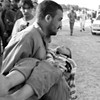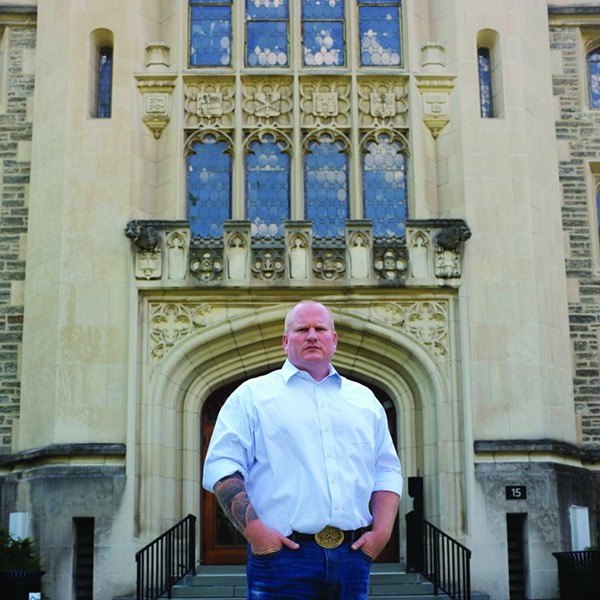The people seem to pour out of the houses now in the hope we can escort them safely out of the line of fire—kids, women, men, anxiously asking us whether they can all go, or only the women and children. We go to ask. The young Marine tells us that men of fighting age can’t leave. What’s fighting age, I want to know. He contemplates. Anything under forty-five. No lower limit.
It appalls me that all those men would be trapped in a city which is about to be destroyed. Not all of them are fighters, not all are armed. It’s going to happen out of the view of the world, out of sight of the media, because most of the media in Fallujah is embedded with the Marines or turned away at the outskirts. Before we can pass the message on, two explosions scatter the crowd in the side street back into their houses.
“If I don’t do it, who will?”
Rana is with the Marines evacuating the family from the house they’re occupying. The pickup isn’t back yet. The families are hiding behind their walls. We wait, because there’s nothing else we can do. We wait in no man’s land. The Marines, at least, are watching us through binoculars. Maybe the local fighters are too.
I’ve got a disappearing hanky in my pocket, so while I’m sitting like a lemon with nowhere to go, gunfire and explosions aplenty all around, I make the hanky disappear, reappear, disappear. It’s always best, I think, to seem completely unthreatening and completely unconcerned—so no one worries about you enough to shoot. We can’t wait too long, though. Rana’s been gone ages. We have to go and get her to hurry. There’s a young man in the group. She’s talked them into letting him leave too.
A man wants to use his police car to carry some of the people, a couple of elderly ones who can’t walk far, the smallest children. It’s missing a door. Who knows if it was really a police car or the car was re-appropriated and just ended up there? It doesn’t matter if it gets more people out faster. They creep from their houses, huddle by the wall, follow us out, their hands up too, and walk up the street clutching babies, bags, each other.
The pickup gets back and we shovel as many onto it as we can as an ambulance arrives from somewhere. A young man waves from the doorway of what’s left of a house, his upper body bare, a blood soaked bandage around his arm, probably a fighter but it makes no difference once someone is wounded and unarmed. There are dead here too. Getting the dead isn’t essential. Like the doctor said, the dead don’t need help, but if it’s easy enough then we will. Since we’re already OK with the soldiers and the ambulance is here, we run down to fetch them in. It’s important in Islam to bury the body straight away.
The ambulance follows us. The soldiers start shouting in English at us for it to stop, pointing guns. It’s moving fast. We’re all yelling, signaling for it to stop but it seems to take forever for the driver to hear and see us. It stops before they open fire. We haul the dead onto the stretchers and run, shoving them in the back. Rana squeezes in the front with the wounded man, and Dave and I crouch in the back beside the bodies. He says he had allergies as a kid and hasn’t got much sense of smell. I wish, retrospectively, for childhood allergies and stick my head out the window.
The bus is going to leave, taking the injured people back to Baghdad, the man with the burns, one of the women who was shot in the jaw and shoulder, several others. Rana says she’s staying to help. Dave and I don’t hesitate: We’re staying too. “If I don’t do it, who will?” has become an accidental motto and I’m acutely aware after the last foray how many people, how many women and children, are still in their houses either because they’ve got nowhere to go, they’re scared to go out of the door or because they’ve chosen to stay.
Then Azzam says we have to go. He hasn’t got contacts with every armed group, only with some. There are different issues to square with each one. We need to get these people back to Baghdad as quickly as we can. If we’re kidnapped or killed it will cause even more problems, so it’s better that we just get on the bus and leave and come back with him as soon as possible.


















